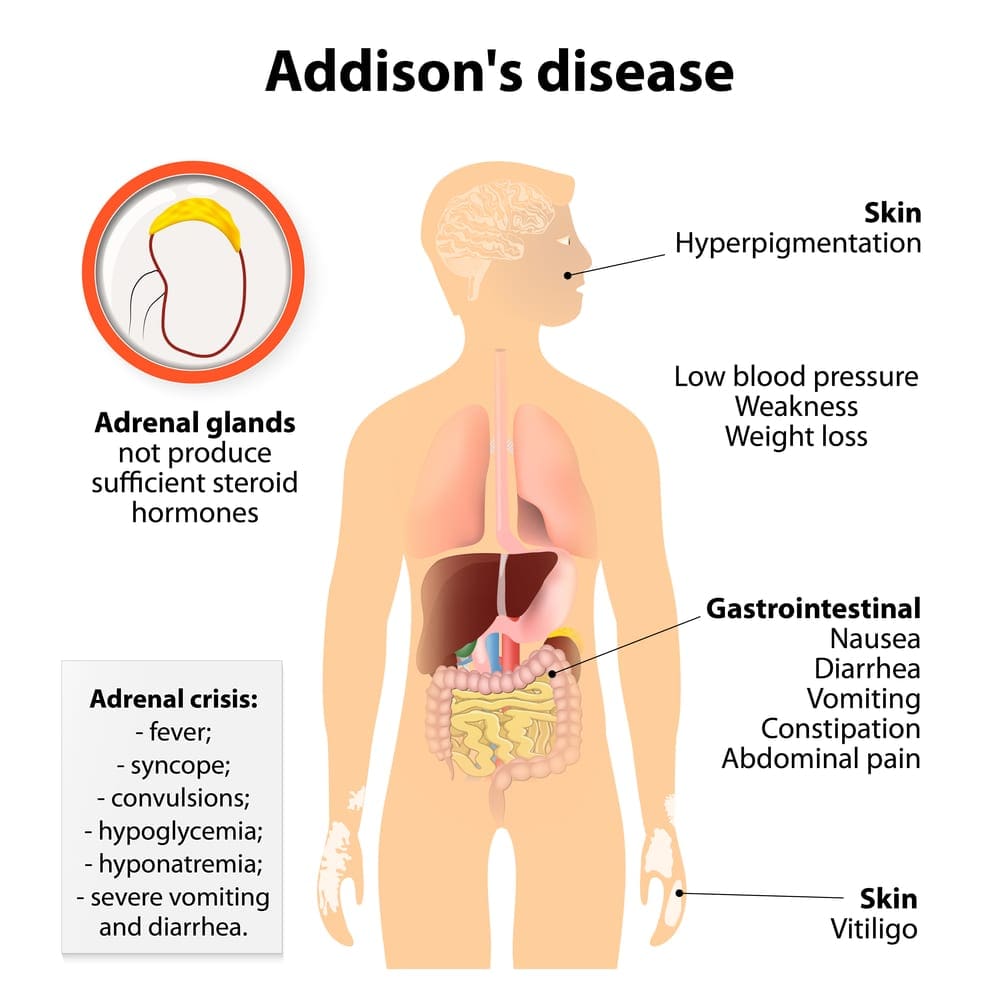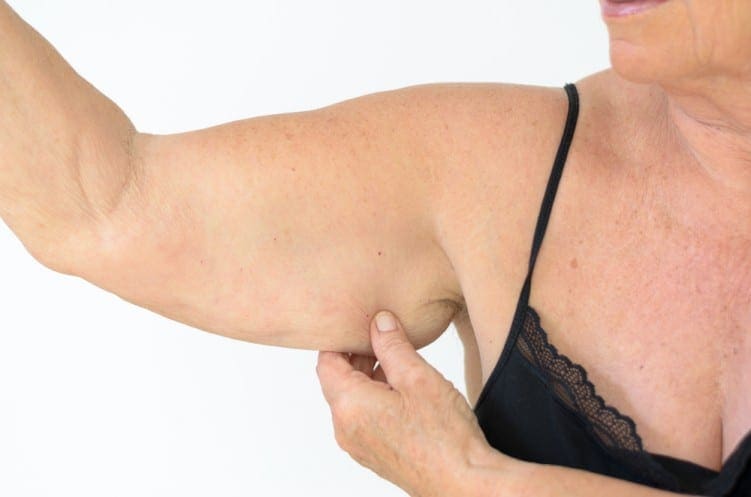People can be affected by Addison’s disease when the adrenal glands stop functioning correctly. The disease is also known as primary adrenal insufficiency. The adrenal glands produce hormones which control the body’s balance of salt and water as well as our response to stress. Treatment is normally carried out by the application of daily medication and subtle changes to lifestyle, which normally enable the sufferer to cope well.
What do the adrenal glands do?
The adrenal glands secrete three types of hormone: Glucocorticoids (including cortisol); Mineralocorticoids (including aldosterone); and sex steroids (androgens):
Cortisol – this controls blood sugar levels within the body and therefore our metabolism. When we are stressed i.e. injured or sick, the production increases.
Aldosterone – regulates the balance of water and salt in the blood.
Androgens – controls the growth of body hair on women.
As each of these hormones are very important, when Addison’s disease develops, many symptoms occur.
What causes this disease?
Frequently it is triggered by autoimmunity. When we are ill, our immune system wards off viruses and bacteria to make us well again but when autoimmunity kicks in, the body can mistakenly attack the adrenal gland. If our pituitary gland begins to malfunction, this can also create adrenal insufficiency.
What are the symptoms of Addison’s disease?
Symptoms usually occur very gradually, over months or years. You may notice excessive tiredness, loss of weight, feeling faint, depressed and general aches and pains. Sickness and diarrhoea can also result. The colour of your skin may also darken and in women, periods may cease and loss of body hair take place.
You can become seriously ill if 90% or more of the adrenal gland cortex is damaged; your body will not cope with sickness or injury, blood pressure will drop and dehydration occur. If emergency treatment is not administered, death can result.
The disease is fairly rare but more common in women than men, particularly between the ages of 30 – 50. If you already have an autoimmune disease then there is a much greater chance of Addison’s disease showing itself. These include Graves’ disease, diabetes type 1, pernicious anaemia and hypothyroidism. Sufferers may also have a family history of autoimmune disease.
Detecting Addison’s disease
If your doctor thinks you may be suffering from Addison’s disease, he will normally carry out blood tests, looking for low sodium levels or high potassium. He may also carry out something called a synacthen test. A hormone similar to the adrenocorticotropic hormone will be injected into the blood to stimulate the adrenal glands.
The cortisol level will be measured prior to the injection and again afterwards, allowing the doctor to measure the level of cortisol production, which has to be at a certain level if the adrenal gland is healthy.
A skilled endocrinologist will also check the level of antibodies in the blood to see if autoimmunity is the cause of the problem. You can normally get these tests done in the Outpatients Department of your local hospital, unless you are suffering from a severe adrenal crisis.
Can Addison’s disease be treated?
Yes, treatment can be administered via the Outpatient’s Department and it will normally consist of you taking hydrocortisone tablets 2/3 times daily to replace the cortisol hormone. Aldosterone is replaced with fludrocortisone tablets which are usually taken once daily.
The precise regime is tailored to suit your particular symptoms. Woman are sometimes recommended to take sex hormones in order to boost the sex drive and feeling of wellbeing but side effects such as excess growth of body and facial hair as well as acne may make this unsuitable. Men do not need additional sex hormones as they are produced naturally in the testes.
Should you find yourself in an ‘adrenal crises then hospital admission will be necessary in order to boost sugar and fluid levels in the body and administer hydrocortisone injections.
Does the treatment have any unpleasant side effects?
As long as your treatment is done carefully and monitored correctly, then you should have to deal with side effects. If you become ill at any time, your hydrocortisone levels will need to be raised to enable your body to cope with the added stress. This may also be needed if you have surgery.
If you suffer sickness and vomiting and your tablets no longer remain in the body, you should always contact a doctor as you may need emergency hydrocortisone injections as a short term remedy. Addison’s disease patients are also recommended to carry hydrocortisone with them when they travel so that if any emergencies occur, it can be injected.
Living with Addison’s disease
Unfortunately, Addison’s disease cannot be cured but, although it remains with patients for a lifetime, it can be controlled effectively with daily drug treatment. As long as sufferers stick to their drug regime and get monitored annually, they should be fine.
It should also be noted that if you have Addison’s, you may be more at risk of developing autoimmune diseases. You will be checked and monitored for these when you go for your annual check-ups.
Whilst Addison’s disease does have a big impact upon the body, as long as it is detected and treated correctly, it should never prevent those suffering with it from having a full and active life.
If you are an Addison’s disease sufferer, no matter your age, you should always carry an emergency injection kit of hydrocortisone with you, just in case it ever needs to be administered quickly during a crisis situation.
If you would like some more information, this link will take you to the support group Addisons.org.uk
Finally if you think this information may help a friend or relative, don’t hesitate to Share it with them.
To keep up to date with health issues such as this, why not sign up to our free newsletter The Best of Friends by clicking on this link.











